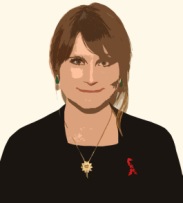U=U, human rights, and criminalisation: highlights from International AIDS Conference

NAT hit Amsterdam 23-27 July 2018 for AIDS2018. This was my first foray into the hotpot of activism and energy that is the International AIDS Conference. It did not disappoint and I’m still absorbing much of it, but here are some of my key take-aways…
U=U is an international phenomenon
The power of ‘Undetectable = Untransmissable’ (U=U) at the international level was consistently evident - be it through lively discussion, the proud wearing of U=U t-shirts, or even celebration through the medium of dance (the U=U dance party was a personal favourite).
This prominence was bolstered by the release of PARTNER2 study findings that give us further confidence that U really does equal U (whether we’re talking about sex between men and women, or sex between men). The study reported over 75,000 sex acts between two serodiscordant men, and not one transmission of HIV. That’s a lot of sex, but nothing compared to that which will now be enjoyed by many, liberated from fear.
Without diminishing the importance of the U=U message, there is another side to it we must not lose focus on. It is not yet relevant to all - not everyone has universal access to treatment or viral load testing. There were many making sure that attention remained on addressing these inequalities. It’s important that in promoting U=U we do not split the community between those who are undetectable and those who are not. We must ensure that people don’t feel their value as an individual is determined by whether they can pass the virus on to others. Human rights are not dependent on viral load.
Human rights must be at the centre of HIV advocacy
Across the world marginalisation and criminalisation of individuals or groups affected by HIV are an ever-pertinent reality. In the context of Trump’s election in the US, Brexit and the rise of the far-right, there is a feeling of a more individualist culture and an increasingly hostile environment for migrants, the LGBT community and other marginalised groups on an international scale. This is having a direct impact on groups affected by HIV. It’s never been more important to defend human rights.
For me, viewing the UK in this wider international context helped me to realign what we do at NAT, within rights-based discourse – it helped me to understand that it’s important that we do not allow the UK to fall short on human rights nor to stop fighting for human rights elsewhere.
In the UK we have equality law that applies to HIV. Our Government is currently not overly receptive to rights-based arguments, and truthfully, we often look elsewhere to get our point across to decision makers. Public health benefit and cost-effectiveness are prominent narratives I use to persuade officials to implement NAT’s policy recommendations. Implicitly I am aware of our human rights-based aims and I see my advocacy strategy a means to an end. But I left Amsterdam feeling that I should be more explicitly putting human rights at the centre when I communicate my work.
It’s time to reignite discussion about HIV criminalisation in the UK
AIDS2018 was marked by significantly greater prominence to criminalisation than in the past. On the Wednesday morning the conference’s biggest stage was handed to Allan Achesa Maleche from Kelin, which fights against criminalisation laws and intervenes on cases across Africa, and Robert Suttle from the Sero Project, who himself was convicted and went to prison in Louisiana USA. These sessions were amongst the most compelling for me. As well as ‘End HIV Criminalisation Now’, ‘Chase the Virus Not the Person’ emerged as a hard-hitting campaign led by Eastern European civil society; rarely was a speaker from this region not accompanied a contingent protesting for this campaign.
As a result, one of the most significant take-aways for me was the importance of placing the work NAT does on criminalisation of HIV transmission in the UK, in a wider context - an international context and that of other forms of criminalisation that harm rather than protect people affected by HIV. The international urgency of this issue was clear – there is no slow-down in criminalisation. In the UK there is a need to reignite our discussions and knowledge sharing. NAT is planning more work on this, so watch this space.
I spend my professional life focussed on HIV the UK – but there was so much to learn from and to take to international colleagues. We are part of a community and are affected by influences that span well beyond our borders.
Not everyone can attend a conference like this, so it’s important that those who can make the most of it and share what we’ve learned….
For more on criminalisation at AIDS2018 see the HIV Justice Network for session listings and check out videos from their pre-conference Beyond Blame
Nam and i-Base were both reporting from the conference and have lots of useful articles, videos and summaries of key research findings.


